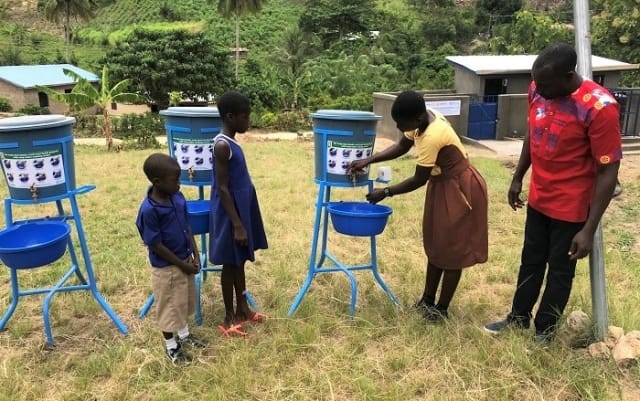News > Blog
Taking Concrete Actions to Leave No One Behind: Government of Ghana Pro-Poor Policies and Sanitation Guidelines for Targeting the Poor and Vulnerable
Published 01/09/2019 by Global Communities

By Alberto Wilde, Ghana Country Director and Eddy Perez, Technical Director for WASH and Health, Global Communities
Despite Ghana’s progress in recent years — it is the fastest growing economy in Africa — it is one of the lowest ranked countries in terms of access to basic sanitation worldwide. Out of the total population of Ghana, 10% use unimproved sanitation facilities, 21% have access to basic sanitation facilities, 13% practice open defecation and 45% use a limited or shared sanitation facility. Open defecation, observed mostly in the low-sanitation access sectors, is also a result of national conflict: open defecation rates are 3% in the relatively peaceful Ashanti region and 89% in the less stable Upper East region. There are many reasons as to why sustainable sanitation access is so low; a critical factor is the level of poverty that exists in many rural areas and the challenges that households have to afford the purchase of a durable and hygienic latrine.
The practice comes with a steep price. Approximately 19,000 Ghanaians, including 3,560 children under five, die each year from diarrheal diseases, 90% of which is directly attributable to open defecation, unsafe water, improper sanitation and hygiene. The current low access rate for sanitation in Ghana, coupled with the high threshold set by the UN Sustainable Development Goals, have prompted an important shift in development thinking. For sanitation and hygiene in particular, the Ghanaian health sector is now including goals around sustainability and equity. Global Communities Ghana, with funding from USAID, as part of the WASH for Health project has been collaborating with the Government of Ghana Ministry of Sanitation and Water Resources to develop Guidelines for Targeting the Poor and Vulnerable for Basic Sanitation Services in Ghana, published in 2018, to provide guidance for targeting poor and vulnerable populations. The partnership also produced a video highlighting the need for such Guidelines. A major policy change reflected in the guidelines is the Government of Ghana support for publicly financed subsidies for poor household sanitation latrines. This is a major shift from policies of the past. The guidelines serve to ensure that equity, inclusion and sustainability for those who are unable to afford household toilets, without undermining strong community cohesion and strength in building their own toilets.
The Guidelines highlight the principles required to assist local governments and development partners in meeting their SDG goals and highlight specific processes to prevent the poor from being shut out of efforts to make sanitation and hygiene attainable in all corners. Virtually all stakeholders countrywide (including external development partners and local governments) now adhere to these guidelines, ensuring harmonization of health and sanitation policies and approaches. The guidelines call for analyzing barriers to sanitation access for poor and socially excluded groups, identify existing community solutions and subsequently, supporting them without distorting the current community cohesion.
In support of these inclusive pro-poor policies and guidelines, the GoG and Global Communities are also working with the private sector to design and develop sanitation products that, coupled with public subsidies, are affordable to the poor. This public-private approach ensures that the poorest can afford durable and hygienic latrines. With financial support from USAID, Global Communities led the design of the “Digni-Loo,” a new improved latrine that is easy to install, safe and hygienic, is comfortable, and most importantly, is more affordable than equivalent sanitation products in the market. The Digni-Loos are being produced and marketed by a local private sector firm (Duraplast) and the GoG recently purchased 20,000 Digni-Loos to be distributed by local governments consistent with their guidelines to subsidies durable toilets for the poorest.
The Guidelines provide local governments and development partners with concrete guidance on how not to leave behind impoverished residents, as past approaches have done. Increasing momentum around the realization of human rights, sanitation is also putting emphasis on non-discriminatory service delivery. Moving forward, reducing the disparities in sanitation access, will require careful monitoring and more evidence that these new policies and approaches increase equitable service provision for all.





